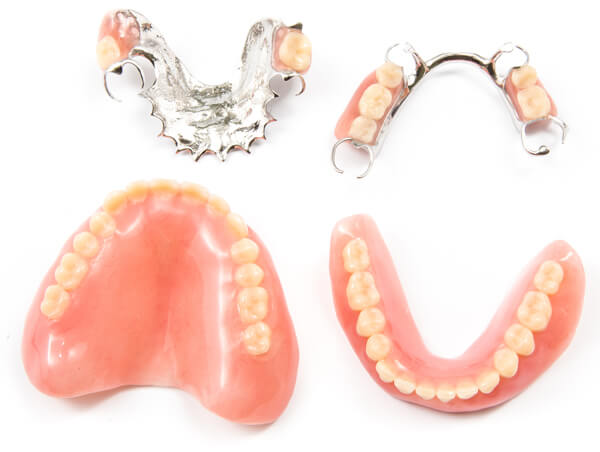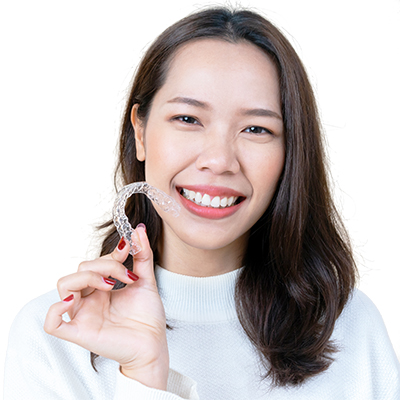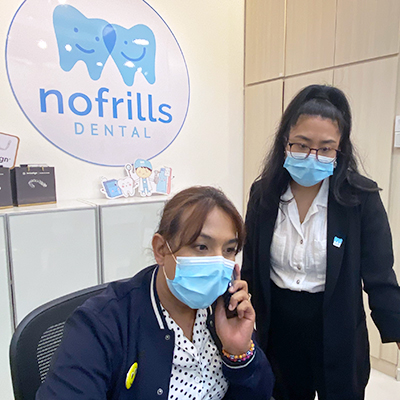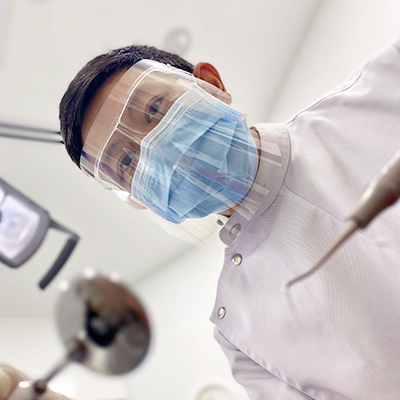Dentures
A denture is a custom-made removable replacement that is worn over the gums to replace missing natural teeth. They are usually made from lifelike resin teeth bonded to an acrylic or chrome base. Dentures will help to improve chewing ability and speech. They also provide support for facial muscles by filling out your face and improving your confidence as a result. Dentures can be a complete full set or just partial ones that replace a few teeth and held in place by metal clips.

Benefits of Dentures
Comfortable and well-made dentures helps you to chew, speak and maintain your facial appearance.
Treatment Process
During the first visit, the dentist makes a mould of the teeth to be sent to a dental laboratory. Once the mould is done, you will be asked to revisit the clinic for a “try-out” session about 7-10 days later to ensure that the dentures will be a good fit. You may require an extra visit to register your bite if there are many teeth to be replaced. Once completed, the dentures will be issued to you.
FAQs on Dentures
1. Is there any risk in wearing dentures?
Dentures tend to accelerate bone loss which makes dentures wearing more uncomfortable in later years.
2. How long can dentures last?
Dentures should be replaced every 3-5 years.
3. How do I care for my dentures?
Dentures should be removed carefully after a meal to wash away any food particles that cling to the surfaces before wearing them again. This helps to reduce any bacterial contact with the teeth and gums. Dentures should also be removed before you sleep and brushed thoroughly with soap and water, and left inside a container of water at room temperature. Avoid adjusting the surfaces or metal parts of the dentures yourself, as it may distort the shape and make the denture unfitting to your mouth. Always ask the dentist for help to adjust your dentures.
4. Will I get used to wearing dentures?
Patients often experience an initial awkwardness when using new dentures. The time needed to get used to them will depend significantly on the patient’s perseverance and experience using dentures. Most patients will take an average of 3 weeks to 4 weeks to get used to them.
When eating, start out with soft and bite sized food (e.g. cutting food into smaller pieces). Chewing gently using both sides of your mouth at the same time will help stabilize the dentures. Over the next few weeks, include other foods until you return to your normal diet.
It is normal to salivate a little more than usual during the first few days when using new dentures. These increased stimulation affecting the salivary glands will cease once you get used to them.
Your speech is dependent on the position of teeth. New dentures are likely to affect your speech initially. Practice your speech by reading out loud and repeating troublesome words until you resume normal speech.
New dentures can cause sore spots on denture supporting areas of the gums and teeth. Please help the dentist identify these areas so that proper adjustments to the dentures can be made. You can stop wearing the dentures if you experience significant irritation.
5. When will I be able to resume normal activities?
You can resume your daily activities immediately. Follow the instructions regarding the insertion and removal of your denture. Do not use too much force in removing your denture. Learning to eat with denture takes practice and time. You may have to cut foods into smaller pieces and chew slowly. Although denture can improve chewing function as opposed to no teeth, it is not possible to achieve the same efficiency as natural teeth. Until you get used to sensing the temperature of hot food, avoid sticky, sharp food. As you gain confidence and ability in using your denture, you can experiment with foods of different textures.
6. How long should I wear my dentures each day?
Generally, dentures can be worn throughout the day. However, as our teeth are more prone to bacteria attacks at night, dentures should be removed before sleeping. This is to prevent the trapping of plaque and bacteria that can result in further complications like gum disease and dental decay.
Dental Services
Book an Appointment!

CHAS & Medisave Accredited Clinics
NoFrills Dental clinics in Singapore participate in Merdeka Generation, Pioneer Generation, CHAS Card and Medisave programs.

Flexible Payment Options Available
Contact us to know more about the versatile & flexible payment options offered at NoFrills Dental clinics.

Opening Hours
Monday - Friday: 10am to 7pm
Saturday: 10am to 5pm
Sunday & Public Holiday: Closed

Book an Appointment
NoFrills Dental offers a wide variety of high-quality dental services. Talk to us to book your next dental appointment with us.

